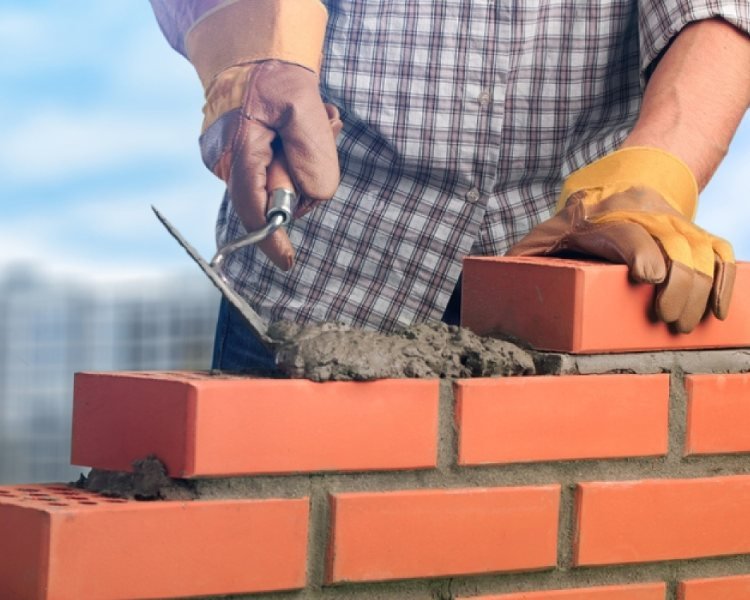Trustworthy Chimney Services: Maintenance and Repairs Done Right
Opening the Secrets of Lasting Masonry Construction Practices for Eco-Friendly Structures
In the realm of modern building, the pursuit of lasting methods has ended up being extremely important. Among the myriad approaches to environment-friendly building, sustainable masonry building and construction stands apart as a time-tested and resilient method that holds a riches of untapped potential. From the selection of products to ingenious construction techniques, the keys to accomplishing sustainability within masonry building and construction are complex and interesting. By exploring the advantages, materials, strategies, and future trends of sustainable stonework, a deeper understanding of exactly how these methods can shape the future of environmentally friendly structures emerges.
Benefits of Sustainable Stonework Building
Accepting sustainable masonry building and construction techniques not only decreases ecological influence yet likewise supplies long-lasting financial advantages to builders and neighborhoods. By using products like recycled bricks, obstructs, and stones, building contractors can substantially reduce the carbon impact of their jobs while advertising source performance. Additionally, sustainable masonry building and construction strategies, such as correct insulation and thermal mass residential or commercial properties, can improve energy performance within structures, resulting in decreased functional expenses over time.
Moreover, the sturdiness and durability of masonry frameworks add to lasting financial benefits. Structures built utilizing lasting stonework techniques often call for much less maintenance and repair work, converting to set you back savings for building contractors and property proprietors. The durability of stonework products likewise makes certain that frameworks stay secure and safe, lowering the demand for frequent remodellings or replacements.
Eco-Friendly Masonry Materials
Making use of environmentally friendly masonry materials is an essential step in the direction of enhancing the sustainability of construction methods and minimizing ecological impact while maximizing lasting economic advantages. Sustainable stonework materials are sourced, generated, and utilized in a way that minimizes general environmental effect. Materials such as recycled bricks, reclaimed rock, and lasting cinder block are becoming increasingly prominent selections for eco-conscious builders. Recycled bricks, as an example, not just divert waste from garbage dumps but likewise call for much less power to generate contrasted to brand-new blocks. Recovered rock provides an unique visual appeal while lowering the requirement for new quarrying. Lasting concrete obstructs include recycled accumulations and may include enhanced insulation residential or commercial properties, contributing to power effectiveness in structures.
Additionally, all-natural materials like adobe, rammed earth, and straw bales give outstanding thermal mass homes, minimizing the requirement for home heating and cooling power. These products are often locally offered, promoting regional economies and reducing transportation-related carbon discharges. By choosing green stonework materials, construction projects can significantly lower their environmental footprint and add to the production of healthier, a lot more lasting developed environments.
Energy-Efficient Stonework Methods
Power effectiveness plays a critical duty in improving the sustainability of stonework building techniques. By executing energy-efficient masonry strategies, contractors can substantially decrease the overall power consumption of a structure, bring about lower functional expenses and a smaller sized ecological impact. One key energy-efficient masonry method is using rock and roller concrete stamp thermal mass, which entails integrating dense products like concrete or block right into the building's framework to take in and save heat. This helps control interior temperatures, decreasing the demand for mechanical home heating and cooling systems.

Advancements in Lasting Stonework
Recent advancements in lasting stonework techniques have actually caused cutting-edge methods that are improving the building and construction sector. One such advancement is the development of self-healing concrete, which utilizes germs embedded within the concrete to recover fractures autonomously. This innovation not just reduces upkeep expenses however likewise enhances the resilience of masonry structures, adding to their sustainability.
An additional remarkable development is using recycled aggregates in stonework building and construction - masonry contractor. By integrating materials such as crushed ceramic waste or recycled glass into concrete blends, building contractors can minimize the environmental effect of construction tasks while maintaining structural stability. This technique not only draws away waste from land fills however additionally preserves all-natural resources, making it a crucial improvement in lasting stonework building and construction
Moreover, the combination of electronic style devices, such as Building Details Modeling (BIM), is revolutionizing the way stonework frameworks are planned and built. BIM enables more exact calculations, decreased material wastefulness, and boosted power effectiveness, inevitably causing even more sustainable building practices. These advancements collectively indicate an appealing future try this web-site for lasting stonework building in the period of green structures.
Future Trends in Stonework Sustainability
With the ingenious strides made in lasting masonry techniques, the future fads in masonry sustainability are poised to further revolutionize the construction sector. One of the crucial patterns forming the future of stonework sustainability is the boosted integration of innovation. Advancements such as Building Information Modeling (BIM) and online fact simulations are being utilized to enhance stonework construction procedures, resulting in minimized material waste and improved energy effectiveness in structures.
Furthermore, the development of novel sustainable materials is established to play a substantial role in improving the eco-friendliness of stonework building and construction. masonry contractor. Advancements like self-healing concrete, recycled accumulations, and bio-based binders are getting traction for their capacity to minimize environmental effect while preserving architectural stability

Final Thought
Finally, lasting masonry building methods supply countless benefits for green buildings. By utilizing eco-friendly products and energy-efficient strategies, masonry can add to an extra sustainable built atmosphere. Developments in sustainable masonry are continuously being established to additionally improve the environmental efficiency of buildings. Looking towards the future, the fad of stonework sustainability is anticipated to expand, causing more environmentally friendly and energy-efficient construction practices cinder block price in the years to come.